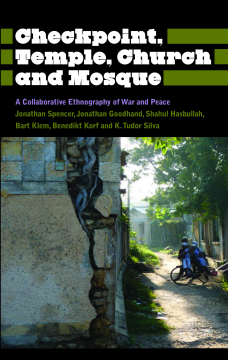
BOOK
Checkpoint, Temple, Church and Mosque
Jonathan Spencer | Jonathan Goodhand | Shahul Hasbullah | Bart Klem | Benedikt Korf | Kalinga Tudor Silva
(2014)
Additional Information
Book Details
Abstract
Is religion best seen as only a cause of war, or is it a source of comfort for those caught up in conflict? In Checkpoint, Temple, Church and Mosque six senior figures in Anthropology, Sociology, Geography and Development Studies set out to answer this question.
Based on fieldwork conducted in Sri Lanka's most religiously diverse and politically troubled region during the country's civil war (1983-2009), it provides a series of new and provocative arguments about the promise of a religiously based civil society, and the strengths and weaknesses of religious organisations and religious leaders in conflict mediation.
The authors argue that for people trapped in long and violent conflicts, religion ultimately plays a contradictory role, and that its institutions are themselves profoundly affected by war - producing a complex picture in which Catholic priests engage with Buddhist monks and new Muslim leaders, and where Hindu temples and Pentecostal churches offer the promise of healing.
The substantive contributions of this book to our understanding of the intertwined life of war and peace are unparalleled and what is even more remarkable is their mode of thinking that privileges co-operative modes of work. An inspiring and deeply moving book'
Veena Das, Krieger-Eisenhower Professor of Anthropology, Johns Hopkins University
'Draws together an extraordinarily rich body of ethnographic research in Sri Lanka that challenges conventional wisdoms about religion and conflict. Exquisitely written and subtly argued this book is essential reading for practitioners and researchers engaged in the fields of development, conflict and religion'
Jude Howell, Professor of International Development, London School of Economics
Table of Contents
| Section Title | Page | Action | Price |
|---|---|---|---|
| Cover | Cover | ||
| Contents | v | ||
| List of Illustrations | vi | ||
| Series Preface | vii | ||
| Acknowledgements | viii | ||
| Glossary and Acronyms | x | ||
| 1. Introduction | 1 | ||
| 2. The East as a Complex Religious Field | 20 | ||
| 3. Land and Water, War and Not War | 45 | ||
| 4. Making Sacred Space | 68 | ||
| 5. Conflict in the Plural | 90 | ||
| 6. Boundary Politics, Religion and Peace-Building | 116 | ||
| 7. Afterword: War's End | 139 | ||
| 8. Reflections | 155 | ||
| Notes | 171 | ||
| Bibliography | 173 | ||
| Index | 182 |
